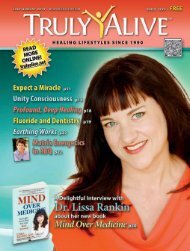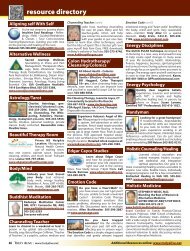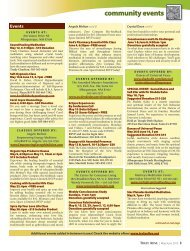reading - Truly Alive Magazine
reading - Truly Alive Magazine
reading - Truly Alive Magazine
You also want an ePaper? Increase the reach of your titles
YUMPU automatically turns print PDFs into web optimized ePapers that Google loves.
Stress…How it Affects Our<br />
Lives and Hormone Balance<br />
By Tom White, RPh, PhC and Frank Latino, RPh, MS, PhC<br />
Former Highland Pharmacy employees Pharmacists Tom White and Frank Latino strike out on their own<br />
with “The Hormone & Anti-Aging Center of New Mexico”(HAAC) a compounding Pharmacy and Clinic.<br />
all stressed out.” How many times have we heard<br />
“I’m this expression in our lives? Has this become<br />
such a common remark that we forget to really understand<br />
what it means? More than likely, it is overstated, but maybe<br />
not. I don’t think we understand how much stress we all have<br />
in our lives. We have become very accustomed to daily stress<br />
and in most cases have been forced to adapt to stress even<br />
in the most extreme cases. STRESS HAS BECOME A WAY<br />
OF LIFE.<br />
In this article, I will discuss “stress” and how it<br />
affects hormone balance; which consequentially<br />
and dramatically affects our health and daily lives.<br />
What is the definition of stress? In short, almost anything<br />
and everything can produce stress. Even when we are<br />
“not stressed” we can be stressed thinking about why we<br />
are not stressed. Below are some of the common stressors<br />
in our lives:<br />
• Job and finances<br />
• Illness, surgery<br />
• Parenthood (Who wrote<br />
the book?...I want a<br />
refund)<br />
• Hormone imbalance (age<br />
related, stressed induced)<br />
• Pollution (all types<br />
including radiation<br />
pollution)<br />
• Alcohol<br />
• Diet (sugar, high<br />
carbohydrate foods)<br />
• Emotional stress (divorce,<br />
relationships, death of a<br />
loved one)<br />
• Physical stress (over<br />
exercise)<br />
• Poor life decisions<br />
• School<br />
• Hydration (fluid balance)<br />
There are basically three types of stress: Acute stress;<br />
stress that has a sudden onset and is quickly resolved.<br />
Chronic stress; stress that may or may not have a sudden<br />
onset, but lasts for a prolonged period of time (maybe our<br />
whole lives). And oxidative stress; or metabolic stress. This<br />
is stress at the cellular level which is generally chronic and<br />
will without a doubt destroy our bodies if left unchecked.<br />
Chronic stress causes the formation of free radicals such<br />
as the, “reactive oxygen species” (ROS). These free radicals<br />
are absolutely necessary to our health. They are used to kill<br />
foreign bacteria, viruses and the like. But when unbridled,<br />
they are indiscriminate killers. These very useful but very<br />
destructive free radicals when left unchecked can kill healthy<br />
cells. The body uses “antioxidants” such as: super oxide<br />
dismutase (SOD), catalase, and glutathione at the cellular<br />
16 <strong>Truly</strong> <strong>Alive</strong> | www.trulyalive.net<br />
level to neutralize the ROS and other free radicals to keep<br />
their destructive behavior in check. In short, anti-oxidant,<br />
anti-oxidant, anti-oxidant becomes absolutely paramount<br />
to good health. Chronic stress leads to oxidative stress and<br />
anti-oxidants are the answer. Chronic stress also affects the<br />
“telomeres”, which are the end caps of a strand of DNA.<br />
Telomeres are constantly regenerated by “telomerase” and<br />
chronic stress reduces this regeneration process. As a result,<br />
the DNA, which contains the chromosomes (which has<br />
the genetic sequencing code to reproduce a cell) becomes<br />
damaged and the cell dies. This can lead to many cell deaths<br />
and tissue necrosis, or death of tissue.<br />
The body tries to control the inflammatory process of<br />
stress by increasing the release of “cortisol” or “hydrocortisone”<br />
produced by the adrenal glands. The adrenal glands<br />
sit just above the kidneys and have a monumental job to<br />
perform. They produce cortisol to control inflammation<br />
and stress. They produce aldosterone, which regulates fluid<br />
balance in the body. They produce adrenalin and nor-adrenalin<br />
for our fight and flight mechanisms. Additionally, they<br />
produce 40% of our sex steroid hormones, i.e. estrogen,<br />
testosterone, DHEA, progesterone.<br />
Fortunately and unfortunately we have a system in the<br />
brain called the “Limbic System”. It is a primitive part of<br />
the brain, which through the process of evolution hasn’t<br />
changed much. It is a part of the brain which has allowed<br />
“man” to survive. It always acts as a defense mechanism.<br />
Through the release of adrenalin, cortisol and aldosterone,<br />
man has been able to survive. In today’s world, we have<br />
replaced primitive man’s survival dilemma with the stress<br />
of everyday life of modern man. The limbic system of<br />
survival does not make a distinction when it comes to<br />
stress. Stress is Stress. Ancient or modern it is all the same.<br />
Good and Bad. Not every stress in our modern day lives<br />
involves a life or death situation as in primitive man. But<br />
the body still responds to stress as a life or death situation.<br />
Therein lays the problem. Modern man (in many ways<br />
due to the Limbic System) is no different than primitive<br />
man. Modern man has exchanged the extreme stress and<br />
challenge of ancient man to survive with the chronic stress<br />
of everyday life of today’s world to survive. This can lead to<br />
hormone imbalance. Remember that the adrenals produce<br />
40% of the sex steroid hormones in the body. That is on a<br />
good day with minimal stress. When we become stressed,<br />
sex steroid hormone production basically stops to increase<br />
cortisol production to control stress. Primitive man’s life














